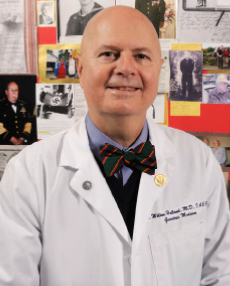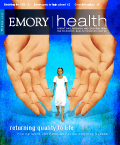Signing the book

The Greatest Generation shares war memories with Emory doctors at the Atlanta VA Medical Center.
Five years ago, Emory geriatrician Wilson Holland began reading Tom Brokaw’s book, The Greatest Generation, the story of those who grew up in the Great Depression and then fought in World War II. He found it hard to put down. He knew these people. As a doctor in the Atlanta VA Medical Center’s Bronze Outpatient Geriatric Clinic (for patients 75 and older), he had worked with thousands of men and women like those Brokaw described. He knew their health problems. He knew the way they stolidly bore up under the aches and limitations of aging or illness, and he knew the spouses, sons, and daughters who brought them to the clinic from throughout north Georgia. But what he didn’t know, what hadn’t seemed appropriate to ask in the busy clinical setting, were their experiences during WWII.
After his encounter with the book, however, Holland began sharing it with his older patients, telling them how much it had moved him to read about their generation’s service and asking if they would like to sign their names in his copy of the book. Perhaps they could add where they served, and if they felt like it, a few words about what they did. As their writing began to fill the margins of The Greatest Generation, Holland brought in Brokaw’s other books of letters and memories from the era. His patients continued to write. No patient ever refused. In fact, some heard from friends about what the doctor was doing and, before he could ask, they asked him if they too could “sign the book.”
More than 1,000 men and women in their late 70s, 80s, and 90s have now recorded their names, branches of the military where they served, and glimpses into history.
US Navy, lost ship in Pacific near Fiji. POW 3 ½ years… Received first message of Roosevelt death, all things came to a halt… Served under General Ray Davis “Last man standing” in the Pacific, lost 72% of my buddies, will always be proud to be an American!... The Battle of the Bulge... Omaha Beach… Escort Destroyer, escorted landing ships for D Day Invasion, multiple attacks… Patrol to protect USS Missouri when signed Peace Treaty in Tokyo Bay… Bataan Death March liberator...
Other former soldiers wrote about watching the flag raised at Iwo Jima, shrapnel that barely missed a sleeping off-duty nurse, and tapping out the telegraph message that Roosevelt had declared war.
Holland had opened a floodgate. Veterans began to bring memorabilia, clippings, souvenirs, and medals to their appointments. The clinic staff set aside several bulletin boards for newspaper clippings, maps, and photographs of teenage soldiers staring into the camera or leaning jocularly against their buddies on distant beaches. Others brought accounts they had written or recorded. One veteran gave several paintings to the clinic, detailed watercolors he had made, he explained, to calm emotions still evoked by memories of his wartime experiences as a pilot. Holland hung them in an exam room where many patients recognized the plane models and were pleased to know that the artist was “one of them.”
|
Wilson Holland was selected as national winner of the 2010 Mark Wolcott Award given annually for Excellence in Clinical Care Delivery by the Veterans Health Administration. |
Holland gently refused gifts that veterans tried to give the doctor whose significance they knew he would understand: Medals of honor. Helmets. A worn, pocketsize Bible through which a bullet had ripped, coming to a halt in the final chapters.
Celebrating their days as soldiers was already part of the lives of some of Holland’s patients. One was given the key to a city for having attended the funeral of every veteran in the county until he was well into his 90s.
Holland learned of another patient’s activities when he was asked to sign a medical certificate to affirm that the 84-year-old was healthy enough to re-enact his 1944 paratrooper jump into occupied France, which occurred just five hours before American troops stormed the Normandy beaches on D-Day. Eighteen-year-old Carl Beck had hit the ground fast, only to find himself and another paratrooper separated from their group. They slept in the hedgerows, dodging German patrols, until a local farmer hid them in his barn, feeding the famished men potatoes, boiled eggs, and hard cider. Two days later, the farmer used sign language to point out a platoon of American infantrymen headed toward occupied Baupte. It wasn’t Beck’s platoon, but he set up a machine gun and helped liberate the town. Newspaper clippings on the clinic bulletin board recount the patient’s successful second jump, and photographs document his visit with the French family who protected him decades ago.
Being a veteran has not been easy for members of the greatest generation. Although some never speak of their military experiences, memories bubble up in nightmares, unease, and flashes of anger or anxiety. One of Holland’s formerly silent patients, Gerald “Bud” Hipps, joined the Marines immediately after Pearl Harbor. When the 17-year-old arrived at Iwo Jima soon after, the black volcanic sand beaches were littered with American bodies. He endured 36 days of one of the bloodiest battles in the Pacific theater. Of the 240 men in his company, only 27 returned. Coming home with a Purple Heart, the decorated veteran wanted nothing to do with war, refusing to watch war movies or apply for government funds. For years, he was unable to bear anyone, even his wife, walking behind him. He often screamed out at night and flailed wildly. When he was in his 80s, what changed things for Hipps was an “I survived Iwo Jima” bumper sticker. To the amazement of his family, he made one of his own. Strangers began to thank him or honk their horns and wave. His grandchildren looked at him with respect. He now speaks at their schools, at community gatherings, and to the local media.
Reading about others’ experiences in the books at the Bronze Clinic and speaking for the first time about their own memories has been therapeutic for several of the clinic’s older patients, says Holland. It has led to recognition of problems that have troubled the veterans throughout their lives and to treatment that has helped mitigate those problems.
The willingness of Holland’s veteran patients to talk has been a great gift to families, many of whom did not realize they had a hero in their midst. It also has been a “familial experience for the caregivers at the VA,” says Holland, “giving us more insight into the lives of our patients.”
As director of Emory’s geriatric fellowship program, which trains hundreds of medical students and residents at the Atlanta VAMC, Holland has another reason to be grateful to the veterans. “Our students are learning that what people have done in their lives can be as important to their health as the medical problems they are experiencing. They are learning to think of patient histories in a whole new way.
“For the Bronze Clinic team now, and for the physicians these young people will become,” adds Holland, “giving our patients the opportunity to sign these books has provided another way both to understand the service of our greatest generation and to honor the courage and sacrifices they made for our freedom.” -EH
|
Emory and the VA: At a glance The partnership between Emory and the Atlanta VA stretches over six decades. Each year, more than 250 Emory doctors and 142 residents provide virtually all physician care at the VA’s hospital and nursing home. Emory scientists have helped place the Atlanta VA among the nation’s top VA centers for research, with more than 500 research projects directed at the most serious health problems faced by veterans. In 1999, the Bronze Outpatient Geriatric Clinic opened to help veterans 75 and older maintain health and independence. A team of physicians, a nurse practitioner, nurses, pharmacists, and social workers collaborate with physical therapists, audiologists, psychiatrists, and others. Holland and Priscilla Zahn, manager of geriatrics and extended care, were original founding physicians. While most veterans in north Georgia are seen in multiple VA community-based outpatient clinics, approximately 2,500 patients—usually the most frail, with the most complicated medical conditions—call the Bronze Clinic their medical home. |
||



